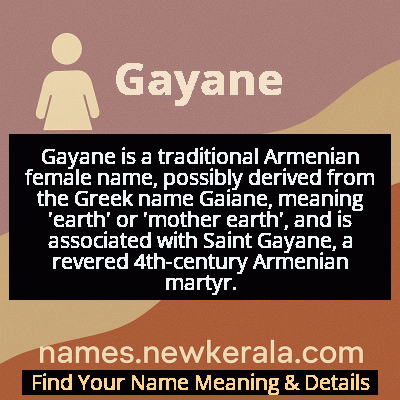Gayane Name Meaning & Details
Origin, Popularity, Numerology Analysis & Name Meaning of Gayane
Discover the origin, meaning, and cultural significance of the name GAYANE. Delve into its historical roots and explore the lasting impact it has had on communities and traditions.
Name
Gayane
Gender
Female
Origin
Armenian
Lucky Number
8
Meaning of the Name - Gayane
Gayane is a traditional Armenian female name, possibly derived from the Greek name Gaiane, meaning 'earth' or 'mother earth', and is associated with Saint Gayane, a revered 4th-century Armenian martyr.
Gayane - Complete Numerology Analysis
Your Numerology Number
Based on Pythagorean Numerology System
Ruling Planet
Saturn
Positive Nature
Ambitious, efficient, realistic, and authoritative.
Negative Traits
Materialistic, stressed, confrontational, and can be overly ambitious.
Lucky Colours
Dark blue, black.
Lucky Days
Saturday.
Lucky Stones
Blue sapphire, amethyst.
Harmony Numbers
2, 4, 6.
Best Suited Professions
Business leaders, managers, financial services, law enforcement.
What People Like About You
Leadership, determination, organizational skills.
Famous People Named Gayane
Saint Gayane
Religious Figure
Early Christian martyr whose death contributed to Armenia becoming the first Christian nation
Gayane Chebotaryan
Composer and Musicologist
Influential Armenian composer who advanced classical music education in Armenia
Gayane Khachaturian
Artist
Celebrated painter known for enriching Soviet Armenian art with distinctive style
Gayane Umerova
Cultural Administrator
Prominent cultural leader preserving Armenian heritage in Crimean institutions
Name Variations & International Equivalents
Click on blue names to explore their detailed meanings. Gray names with will be available soon.
Cultural & Historical Significance
The name's cultural significance extends beyond religious contexts into the realms of art, music, and national identity. Aram Khachaturian's ballet 'Gayane', composed during World War II, brought the name international recognition while reinforcing its association with Armenian cultural pride. In literature and poetry, characters named Gayane often embody idealized Armenian femininity—strong, virtuous, and deeply connected to tradition. For the Armenian diaspora, the name serves as an important cultural anchor, helping to maintain connections to homeland and heritage across generations. This multi-layered cultural significance makes Gayane more than just a personal name; it represents a living link to Armenia's historical narrative and spiritual legacy.
Extended Personality Analysis
Women bearing the name Gayane are typically associated with a distinctive blend of strength and sensitivity that reflects the name's historical and cultural weight. They often demonstrate remarkable resilience in the face of adversity, drawing from the example of their namesake saint while adapting these qualities to modern contexts. Gayanes are frequently described as deeply principled individuals who value integrity and authenticity in their relationships and endeavors. Their connection to Armenian heritage often manifests as a strong sense of cultural responsibility—many become keepers of family traditions, cultural practices, and linguistic heritage.
In social and professional settings, Gayanes tend to be respected for their combination of warmth and dignity. They often possess artistic or creative talents, whether in visual arts, music, literature, or other expressive forms. Their emotional intelligence is typically well-developed, allowing them to navigate complex social situations with grace and insight. While they may appear reserved initially, Gayanes usually form deep, lasting relationships based on mutual respect and understanding. Their leadership style, when it emerges, tends to be collaborative rather than authoritarian, reflecting the communal values embedded in Armenian culture. These personality characteristics, while not universal, represent cultural ideals associated with the name and are often consciously or unconsciously cultivated by those who bear it.
Modern Usage & Popularity
In contemporary naming practices, Gayane maintains its status as a culturally significant choice while adapting to modern preferences. The name enjoys steady popularity in Armenia, where it consistently ranks within the top 100 female names, with particular strength in regions with deep historical roots like Aragatsotn and Armavir provinces. Among the global Armenian diaspora—particularly in communities in Russia, the United States, Lebanon, and France—Gayane serves as a powerful identifier of cultural heritage, often chosen by parents who want to maintain strong connections to Armenian identity. Recent years have seen a mild resurgence in the name's popularity, partly driven by renewed interest in traditional names and cultural preservation efforts. Modern Gayanes often navigate interesting intersections between tradition and contemporaneity, with many achieving prominence in fields like technology, business, and international relations while maintaining their cultural connections. The name's adaptability to various professional and social contexts, combined with its deep cultural resonance, ensures its continued relevance in the 21st century.
Symbolic & Spiritual Meanings
Symbolically, Gayane represents multiple layers of meaning that have accumulated over centuries of cultural history. At its core, the name symbolizes the triumph of faith over persecution, reflecting the story of Saint Gayane's martyrdom and its role in Armenia's conversion to Christianity. This historical narrative gives the name connotations of spiritual courage and the power of conviction. Beyond religious symbolism, Gayane represents cultural endurance—the ability of Armenian identity to survive and flourish despite centuries of foreign domination, genocide, and diaspora. The name evokes the image of cultural transmission across generations, much like the ancient manuscripts and khachkars that have preserved Armenian heritage through turbulent times.
Metaphorically, Gayane can be understood as representing the bridge between sacrifice and renewal, between individual commitment and collective identity. The name carries the symbolic weight of Armenia's landscape itself—ancient yet enduring, rooted in tradition yet constantly evolving. In a psychological sense, it symbolizes the integration of historical consciousness with contemporary identity, suggesting that understanding one's past is essential to navigating the present. For many Armenians, the name also symbolizes feminine strength that is both gentle and formidable, reflecting the dual role of women as both preservers of tradition and agents of change in Armenian society.

